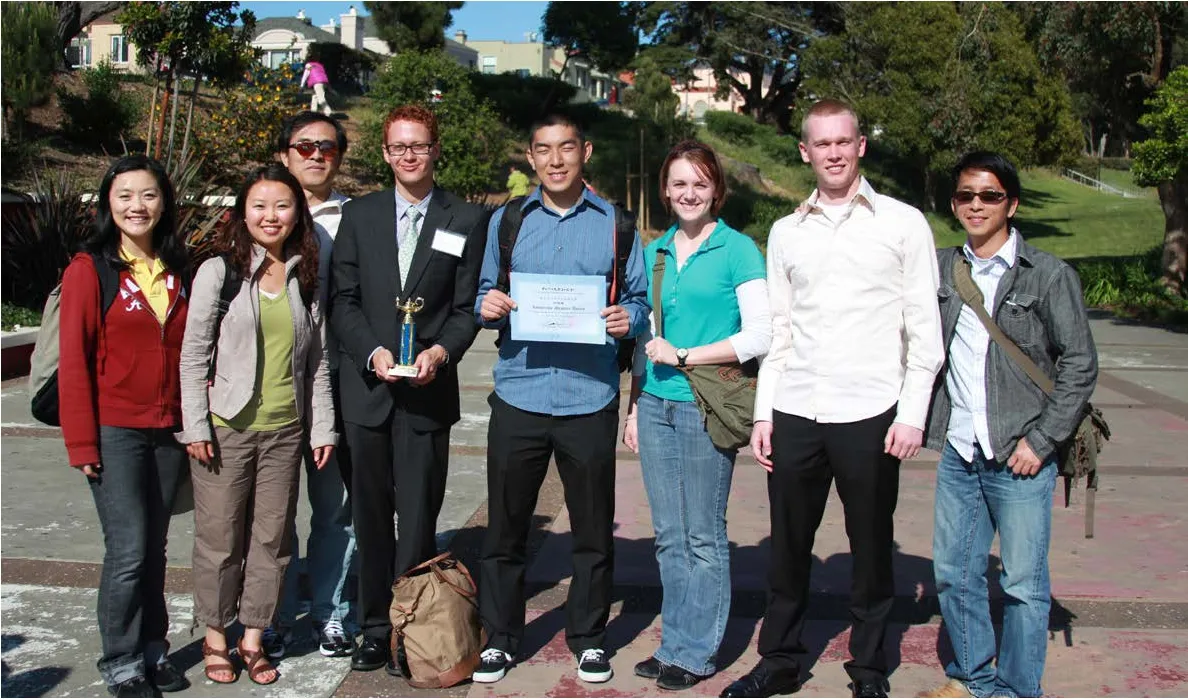I am Teaching Chinese in a U.S. College
□ Liu Xuetao
I am from Chongqing, and I was born in the 70s. I graduated from Sichuan Foreign Language University in 1995 with a bachelor’s degree in English Language and Culture. I pursued my master’s degree in Public Administration in International Management at the Monterey Institute of International Studies from 2001 to 2003. From 2003 to 2008, I worked as a Human Resources professional at the Pebble Beach Company. In 2009,I started working as an Assistant Professor and teaching team leader at the Chinese Department of a college in California. Over the past nine years since I started teaching, I have witnessed many groups of students walk across the graduation podium,delivering speeches in fluent Chinese. I cannot help but feel very proud of them. In just one and half years, a student who starts out as a total stranger to the Chinese language is eventually able to communicate freely in Mandarin without major obstacles -we as human beings surely have great language potential. To me, teaching Chinese as a foreign language is a career full of new challenges. I hereby wish to share with you some of my experiences in this field.
The Chinese basic course that I am currently teaching is a 64 week program. Students can obtain an associate degree upon successful completion of the program, after fulfilling some additional credits. The majority of the students are recent high school graduates in America, a small portion of them are college graduates or people with work experiences. Most of the students do not have any Chinese language knowledge prior to this program. Our school promotes an “immersion” learning environment, in which everyone speaks the target language. The course itself is divided into three modalities: listening, reading,and speaking. Students’ study load is pretty heavy with six to seven hours of classes per day plus homework. The intense nature of the course can be quite challenging not only to the students, but also to the teaching team.
Language is a carrier of a culture, and an inseparable part of the culture. It not only reflects the culture, but also re-shapes the development of the culture. As I remembered at the early stage of the course, we came across the topic “talking about your family.” In this chapter, students were learning how to introduce themselves and family members. During the learning process,students were constantly asking the following questions: “How to say my half-brother?” or “How to say my stepfather?” Students were very curious as to why it takes almost a whole sentence in Chinese to translate one or two words in English. After some thorough thinking, I found a possible explanation: traditionally Chinese people placed high value on the unity of a family, words such as “divorce” or “getting re-married” did not exist until very recently. Therefore, the Chinese language does not have exact words to describe members of a newly established family as a result of a divorce, such as “half-brother” or “stepfather.” Instead of finding exact matching words, the only way we can translate these words is to explain the concept, which results in longer phrases or sentences.

Students are givingper for manceson the“Language Day”Photo graphed by Tan Hanwei
In addition, when students were learning the topic of“medical system,” they often had a hard time understanding the meaning of words such as: “Hospital Registration Card,”“Medical Record Book,” and “Medicine Pricing Window.” This is because the medical system in America is very different from that in China. By the same token, “eating” plays a very important role in the Chinese culture. For those who do not have a thorough understanding of the Chinese “eating” culture, it will not be easy to understand the real meaning behind phrases such as“eats vinegar” meaning to feel jealous, “eats from one big bowl”meaning egalitarianism, “eats soft food but refuses hard food”meaning amenable to coaxing but not coercion, or “if you cannot eat it all, you will have to take it home” meaning you will have to bear the consequences.

Liu Xuetao (the first from left) tookagroup Photo with the winners of the speechcon test.Photo graphed by Chen Chengfu
I am always pondering how we can guide foreign students to learn the Chinese language and understand the Chinese culture at the same time, within a relatively short period of time. I have been practicing a method of incorporating cultural elements into day-to-day language teaching, and I have found this method works very well. For example, when we are learning the concept of“Compound household,” I select photos and videos to show the students what these kinds of traditional houses look like, therefore making it easier for the students to understand these housing styles and the related community environments. I was very delighted when one of my students, who came from an architectural family background, told me that he will build his future house in the compound house style, so his entire family can live happily together.From his expression, we know that this student really likes the “compound household” building style and living atmosphere, and he has a good understanding of what this concept really means. It takes time to develop a deep understanding of the Chinese culture;therefore, it is important to cultivate students’ cultural awareness at an early learning stage.
Chinese characters are a carrier of the Chinese language, they are also the main component that distinguish the Chinese language from other languages. For beginners, to learn Chinese characters is not easy - our students are no exception. Our textbooks are written in long form Chinese characters with the purpose of introducing the students to traditional characters first so they can have an easy time recognizing simplified characters.This learning process starts hard, but gradually becomes easier. When practicing Chinese character writing, students were often “drawing” the characters instead of writing them. In order to help the students write Chinese characters, we designed a writing class in which teachers helped students analyze the structures of the characters, so the students could write characters correctly and effectively. In addition,we also guided students to make their own hand written flash cards to reinforce their memory. We asked the students to write daily journals starting week eight of the program. As we can see, after nine months of practicing journal writing, students not only improved their reading comprehension skill,but also increased their interests towards Chinese characters and the Chinese culture.
In foreign language learning listening, speaking,reading, and writing need to go side by side. If we combine these elements, we can put listening and speaking in one group and reading and writing in another group. When you study one element in a group and incorporate the other element in the same group, you will achieve higher efficiency. For example, weak listening skill often times is the side effect of a poor speaking and communication skill. One of my students claimed himself to be“tone deaf,” because he could not hear or say the tones correctly. Sound discrimination is a crucial skill in learning the Chinese language, particularly in listening. Facing this challenge, the student’s study strategy was simple and straight forward:keep speaking Chinese, because, as he put it, “if I can say something in Chinese correctly, I can hear it correctly.” Starting from the first semester, he spoke only Chinese, whether it was in the classroom or during class breaks. At the end of the 64 week program, his listening comprehension reached HSK level five, which means his language level will allow him to do professional work in China. His learning journey was not smooth sailing, as he was often seen as struggling in his class. However, he found his secret to success and became a role model for target language speaking for the entire class.
After 64 weeks of study, most of the students’listening and reading skills reached HSK level five or higher, and they have no problem communicating orally with Chinese native speakers.
Teaching Chinese as a foreign language is a fascinating career but full of challenges. I am very fortunate to lead a teaching team that works together collectively and supportively. Each of us strive to make our due contributions to promoting the Chinese language and culture to the rest of the world.

